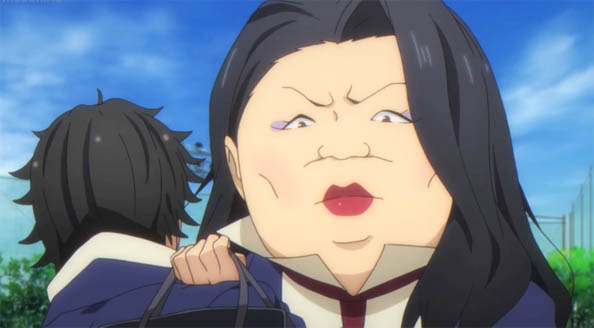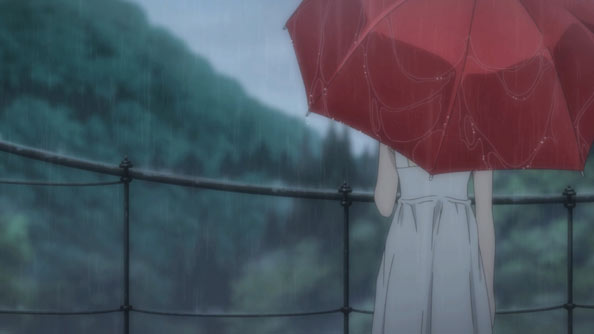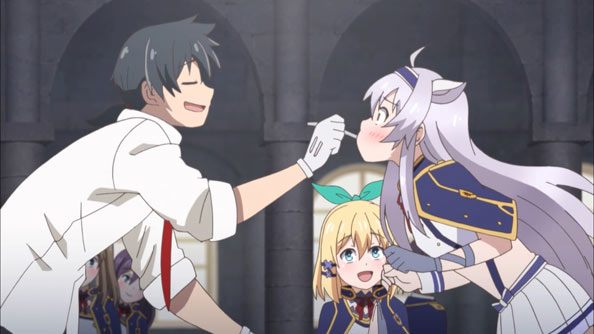
Koharu Yoshino has a memory of being crowned Queen when she was very little, and ever since, has felt like she was meant for greater things; that she wasn’t just a normal girl who escaped the sticks to attend college in Tokyo. Now 20, reality seems to mock Yoshino’s pretensions of royalty, and her phone’s inbox amasses “good luck” in the form of polite rejections from job interviews.
The last thing Yoshino wants is to move back in with her folks in her sleepy, aging speck hometown, and as a city boy myself, I can relate to never wanting to stray too far from the gleaming skyscrapers and sheer dense humanity of a big city.

But she’s down to 980 yen in her bank account, and when she graduates from college, her parents will either welcome her back with open arms, or cut her off. Gal needs cash, fast. So when she gets a phone call from a promotional agency she once modeled for (and by once I mean one time), offering work in the sleepy town of Manoyama, she’s in no position to decline. 980 yen will not get you far in Tokyo, after all.
So when the convertred City Girl takes the train out to Manoyama and catches the picturesque sight of mountains, gently rolling hills, farmland, and sky, she declares “there’s nothing here” and wonders if she got on the wrong train.

She didn’t, but it would seem she is the wrong Koharu. The town board chief Ushimatsu fumes about her not being the beloved (by him) idol Koharu Tsubaki, whom he meant to crown as Queen of the “Kingdom of Chupakabura”, part of a common practice of small towns raising “independent countries” for tourism purposes during the boom years.
Though the boom went bust, Ushimatsu is committed to restoring the “monarchy” and, hopefully, his rapidly aging and emptying town. Since Tsubaki died eight years ago, he settles for Yoshino, and her coronation is witnessed by a modest crowd of 150 (Note the similarity to Yoshino’s hazy memory of being a Queen).

After the coronation, Yoshino is honored with a feast—albeit just another night of eating and beer-drinking with the old town board members. It’s a warm and welcoming sight, but one gets the feeling she’s not planning on staying more than a day, and may even head back to the station and Tokyo before too long.
These are the dreaded sticks, after all. She sees the shuttered shops and wrinkled faces and remembers the hometown she left and to where she vowed never to return.

But when Shiori (who is her age) drops her off at an absolutely awesome log cabin, she meets another beautiful young woman who gives her a rude awakening: the Queen position is for a year, not a day. It was right there, black-and-white, clear as crystal, in her contract, which she clearly just skimmed.
Unable to accept her fate, Yoshino dashes out into the night, but there’s a weird ukulele player on the bus (her announcement she’s getting off and slow backing out of the bus is the best gag of the ep) and even though it’s barely 10pm, the station is closed.
She even encounters the town’s famed “Chupakabura”, the monster of legend ‘her’ kingdom is named after, and “saves” Shiori by smacking it good, revealing it’s Ushimatsu she smacked. On the ride back to the cabin, Shiori offers her heartfelt hope that Yoshino will stay, if for no other reason than so she can have someone her own age around, working together to make the town a livelier place.

Yoshino is grateful for the kind words, and the positive vibes she starts to get from the town only multiply when she returns to her ‘castle’ (the cabin was locked). A display of photos shows that she was here before. Not only that, as a little girl she was the kingdom’s 100,000th visitor, and crowned as Queen back then.
The realization that her memory was indeed real, and imbued in her a sense of privilege, was a really nice moment, but it doesn’t transform Yoshino; she’s still reluctant to stay and be Queen of Chupakabura, but with her last job prospect back in Tokyo fizzling out, she doesn’t have much choice.
Sakura Quest was a fun ride. Yoshino is an interesting character: she’s not a high schooler for once, but an adult, albeit a young one, and perhaps because of that her jadedness is much more susceptible to neutralization than she thinks. The rest of the cast seems strong too, and the show itself looks great. This has the makings of another P.A. Works winner so far.
















































